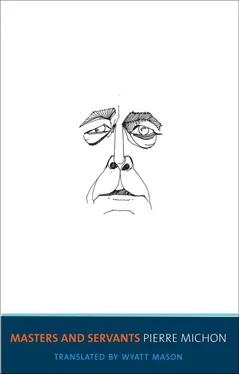Pierre Michon - Masters and Servants
Здесь есть возможность читать онлайн «Pierre Michon - Masters and Servants» весь текст электронной книги совершенно бесплатно (целиком полную версию без сокращений). В некоторых случаях можно слушать аудио, скачать через торрент в формате fb2 и присутствует краткое содержание. Год выпуска: 2013, Издательство: Yale University Press, Жанр: Современная проза, на английском языке. Описание произведения, (предисловие) а так же отзывы посетителей доступны на портале библиотеки ЛибКат.
- Название:Masters and Servants
- Автор:
- Издательство:Yale University Press
- Жанр:
- Год:2013
- ISBN:нет данных
- Рейтинг книги:3 / 5. Голосов: 1
-
Избранное:Добавить в избранное
- Отзывы:
-
Ваша оценка:
- 60
- 1
- 2
- 3
- 4
- 5
Masters and Servants: краткое содержание, описание и аннотация
Предлагаем к чтению аннотацию, описание, краткое содержание или предисловие (зависит от того, что написал сам автор книги «Masters and Servants»). Если вы не нашли необходимую информацию о книге — напишите в комментариях, мы постараемся отыскать её.
Masters and Servants — читать онлайн бесплатно полную книгу (весь текст) целиком
Ниже представлен текст книги, разбитый по страницам. Система сохранения места последней прочитанной страницы, позволяет с удобством читать онлайн бесплатно книгу «Masters and Servants», без необходимости каждый раз заново искать на чём Вы остановились. Поставьте закладку, и сможете в любой момент перейти на страницу, на которой закончили чтение.
Интервал:
Закладка:
What did he do in Aragon? He painted, Señora, of course. And there, our mothers did not see him, but his own mother did, doña Gracia, and the daughters of those whom he took to bed, washerwomen from Ebre or whores; we don’t know anything about them because they generally don’t say anything while beating laundry and rolling onto their backs, tending their chilblain and their native shame, obstinate, lips pursed, arrogant, and ruined; but perhaps in an unknown album he drew them, on a gold background, just as he saw them and without question exactly as they were, incomplete, their faces somewhat disturbed, like the face of a river sullied by blue washing powder, their gazes like a pond, and all of their features hesitating between a childhood barely tasted and on the brink of collapse, and eternal old age. No, it is very unlikely that he painted them that way; it’s even unlikely that he’d had them, because he set joy aside for later, for when he would be Mengs or Tiepolo, when condesas are yours for the taking and ceilings are there for you to paint; and his mother told our mothers that he had been a good and proper son, not undisciplined but industrious, swinging open the door to his father’s studio before dawn, his father the master gilder who had been a good and proper husband, thus crossing this studio where his candle illuminated reredoses peopled with paradise and devotional statues of San Isidro, San Antonio, Santiago, all of them staring out at you, blessing you, all of them golden and in perfect relief, bright and true like all that the Señor created. So, said doña Gracia, at dawn he would enter his father’s studio of shrines and crosses, passing through it to reach his very own, much smaller studio that had been granted in a corner of his father’s — because the son could no longer work with Luzán, his master, they had had a falling out; and all day long he wore himself out painting, maybe Venuses and prophets, certainly some San Isidros and some Santiagos too, as fair as el Señor had made them and clearly calling to Him; and when doña Gracia came in with sausage, with chocolate, she found him on his knees in front of his painting, his nose to the canvas, with little strokes ironing out one of those impeccable frocks in which Zurbarán decked out his chartreuse saints, or one of those magical starched cowls that either pious housewives or angels must just have ironed; or yet again, but more sullen this time, as if he had just crushed some reds into the wounds of the Savior, agonizing over the holy hands in the Italian manner, those delicate fingers, happy, visible, in which every knuckle is delineated, bending and caressing the miraculous space, thick and bright; other times he stood as tall as his little body would, with the air of one painting vast backgrounds, insolent but precise, with all the brio of the Venetians: he was playing, said doña Gracia, he was like a child on his father’s shoulders. She didn’t say, doña Gracia, that while the father was gilding a beard or Saint Peter’s sacred keys with his little brush, he might hear a curse from the other side of the studio, a canvas bursting like a drum, and the little fatso laughing cruelly while hacking his stretcher to bits; that sort of thing mothers pretend not to know about. On the other hand, what she said that we do want to believe is that he liked to horse around on public holidays, in their little patch of land in the countryside of Fuendetodos, to thrash around with the feverish athleticism that seems to take particular possession of fat men; in the company of the little toughs his age he pestered some baby bull and sometimes even a grown one, some thoroughly real, thoroughly black beast, although this was probably in an impromptu arena with an impromptu cape, some red rag still dripping with dye; but with a real sword too, made of iron that cuts. Even in a place as lost as Fuendetodos there would have been bulls to slay. This we all know, because later he prided himself on it, as though he had passed his insouciant jeunesse at such play, fighting bulls with only cape, dress culottes, and pink stockings, not fiddling desperately with Italian draperies and Sevillian frocks in a studio jammed with vermilion saints destined for use in the sundry chapters; and he talked as though the spectacle had always taken place in the light of day, in the light of the July of his youth, a youth invented for the benefit of others and perhaps even for himself. But we, we didn’t see him fighting bulls; and nothing prevents us from thinking that beneath the confusion of a rainy March sky of his twentieth year, he thought he witnessed a perfect disaster, perfectly in keeping with our botched Creation: it rained that day on Fuendetodos, on the smoking black fur, the soft nostrils; slipshod hooves lost their footing, mud splattered everywhere; something suffered there, as likely the sky and its rain as the beast and its matador; the matador wiped his eyelids with his forearm to see the beast clearly so he could stab it with his rapier; no sun burst forth at the final blow, la mise à mort , no flurry of blows, only something that dripped a little, like a bad painting one would happily destroy. And around this heap of ruined black meat that one would happily destroy, heavy and formless, with blue cheeks, conceived during one of those rapid, furious couplings in the fields, the Aragonese peasantry shouted lifeless curses into the rain, dancing a jig as old as time, all gray but for scarlet on one of their shoulders, the cape which already was fading. One doesn’t fight bulls in the rain, Señora? Ah, of course. The impeccable chests of white horses rise up through the blue of the ceilings. Winged creatures leave their weights to the land and carry their shapes and songs above, into the eternally clement heavens. Yes, said doña Gracia, he fought bulls on public holidays, but during the week he took great care to paint pretty paintings. He was industrious.
And of course he toiled away dutifully; because without such industry, he wouldn’t have landed the little commissions that we know he honored in Sobadriel, in Remolinos, in Aula Dei, and with the Carthusians, little towns just a stone’s throw from Saragossa, less than a morning away by donkey from the studio filled with golden saints, and there in the monasteries, in the little palaces of parvenus, in forgotten, tumbledown churches, other portraits of saints were waiting for him, this time his own portraits, though scarcely less golden; saints whose commissioners were looking for an easygoing dauber who was unpretentious, not Italian in his ways but who painted in the Italian manner, who preferred the soul to the shape, as one says in the provinces, in short someone suitable, someone deferential to his assistants and, toward the churchwarden, polite. What more particular merit won him his commissions? Please Señora, no, not his talent, which perhaps a few clairvoyants had perceived when the rest of the world had its eyes closed; not the royal palette that he did not yet have, nor the great spirit that perhaps he never had; not the gift of divine and eccentric observation that the ignorant ascribe to artists: come now, even we have eyes. No particular merit, then, but his willingness, the way he understood that by rejecting his project one year someone was accepting it the next, the overzealousness apparent in coming from Saragossa on his own ass rather than on one of the abbey’s, and the speed with which he animated a face, altering it with minute and disastrous additions that a prior — keen on antiques, who long ago had made the trip to Saint Peter’s and therefore had seen it all — suggested paternally, and not without feeling. He was in hell, really: not because he didn’t know how to paint, because he had learned all that, something half mankind can learn, indeed, anyone, with practice; but because a real interest in painting — a field in which, who knows why, he had been tossed like a bull into an arena or each man into his own life — had eluded him; but nonetheless he loved painting, as every man loves his own life, and perhaps as even a bull loves his arena; there are those who have said that what exasperated him in those days was having to throw a tribe of angels onto a wall or toss up a meeting between the Living God and his humble little Witnesses, and they note how well he painted those humble folk, and go on to talk our ears off about how he loved only the humble. And we all know that it exasperated him equally to have to toss some muddy washerwomen and some local crazies into a little album, later on: we all know that painting, what he called painting, was always unattainable for him, and that was why he painted. Well, not exactly: it brought money, too, had fattened the priceless Mengs and the more reasonable but equally unreasonable Giaquinto, and he wanted to fatten up, he too, the little fatso. So, in order to fatten himself up, you understand, in the little Carthusian monasteries in the countryside, he put a little Tiepolo into the blue skies, a little Zurbarán into draperies that fall to Earth and break; he made clouds upon which to sit when one is Up Above, and victorious wings clinging to angelic shoulder blades like Mardi Gras masks; a general indifference prevails in the humble little witness, the saints martyred and mitered, drawn and quartered or painted in purple, as if none of them is there at all. He fiddled with things to make them look pretty, not that he even knew the meaning of such a word, Señora, what we mean when we call something pretty . He exaggerated everything, even modesty, because he thought that a day would arrive when he would do as Mengs or Tiepolo had, that is, would pocket what they had pocketed; but without question, most of the time, his exaggerations took the form of absolute fury, invisibly, or of absolute laughter, the sound of which we are perhaps wiser to ignore; and if that poor old woman who polishes the gold of the altar and changes the spoiled lilies in the vases had entered the chapel and heard this laugh, and, though forbidden to, had lifted her head to look at the frescoist, holding onto his scaffold with two hands, beneath another gaggle of archangels, she really would have had to ask why he was laughing. “Oh,” Francisco would have said, “that old half-blind sick-dog-of-a-prior stared a little too long at my Saint Jerome and just took off with his tail between his legs, as if the saint had walked out of the woods and bitten him.” And at this the poor woman would have laughed too.
Читать дальшеИнтервал:
Закладка:
Похожие книги на «Masters and Servants»
Представляем Вашему вниманию похожие книги на «Masters and Servants» списком для выбора. Мы отобрали схожую по названию и смыслу литературу в надежде предоставить читателям больше вариантов отыскать новые, интересные, ещё непрочитанные произведения.
Обсуждение, отзывы о книге «Masters and Servants» и просто собственные мнения читателей. Оставьте ваши комментарии, напишите, что Вы думаете о произведении, его смысле или главных героях. Укажите что конкретно понравилось, а что нет, и почему Вы так считаете.












